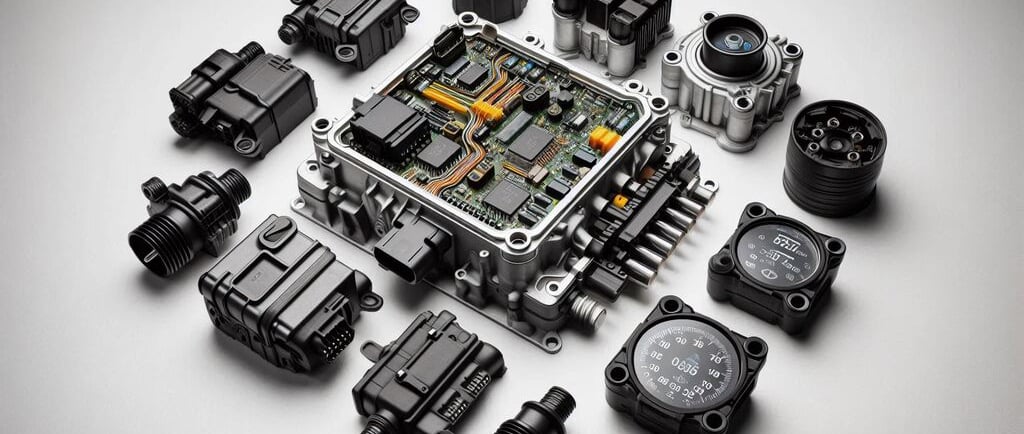ECUs (Engine Control Units) and Sensors
In today’s modern vehicles, the engine doesn’t just rely on mechanical parts to function smoothly.
ELECTRICAL SYSTEMS
11/14/20244 min read


Understanding ECUs (Engine Control Units) and Sensors: The Brains Behind Your Car’s Performance
In today’s modern vehicles, the engine doesn’t just rely on mechanical parts to function smoothly. Thanks to the advancements in automotive technology, much of a car’s engine control and performance is managed electronically by Engine Control Units (ECUs) and a range of sensors. These small but powerful components work together to optimize fuel efficiency, reduce emissions, and improve overall engine performance. In this article, we’ll take a closer look at ECUs, sensors, and their importance in modern vehicles.
What is an ECU (Engine Control Unit)?
At the heart of modern vehicle engines is the Engine Control Unit (ECU)—a sophisticated onboard computer system responsible for managing engine performance. The ECU acts as the brain of the vehicle, continuously monitoring and controlling various aspects of engine function to ensure smooth operation.
Key Functions of an ECU
The ECU is designed to receive input from different sensors around the vehicle and adjust the engine’s performance accordingly. Here’s a breakdown of some of its key functions:
Fuel Injection Control: The ECU adjusts the fuel injector to optimize fuel delivery for maximum efficiency and power.
Ignition Timing: The ECU controls the timing of the spark to ensure optimal combustion and engine efficiency.
Emissions Control: By monitoring and adjusting the engine’s exhaust systems, the ECU helps keep emissions within regulatory limits.
Transmission Control: In some vehicles, the ECU also helps manage the automatic transmission, ensuring smooth shifting based on driving conditions.
Sensors: The Eyes and Ears of the ECU
ECUs depend heavily on a network of sensors to gather real-time data about the engine’s performance and environmental conditions. These sensors continuously send information to the ECU, which processes the data and makes adjustments to improve performance.
Common Types of Sensors Used by the ECU
There are several types of sensors that work with the ECU to monitor engine performance. Some of the most common include:
Oxygen Sensors (O2 Sensors): These sensors monitor the oxygen level in the exhaust, helping the ECU adjust the air-to-fuel ratio for more efficient combustion.
Mass Air Flow (MAF) Sensors: These sensors measure the amount of air entering the engine, allowing the ECU to adjust fuel injection accordingly.
Throttle Position Sensor (TPS): The TPS monitors the position of the throttle, helping the ECU regulate engine speed and power.
Coolant Temperature Sensors: These sensors help the ECU manage engine temperature by adjusting the fuel mixture or ignition timing.
Crankshaft and Camshaft Position Sensors: These sensors provide crucial information to the ECU about the position of the crankshaft and camshaft, which is essential for accurate ignition timing and fuel injection.
How ECUs and Sensors Work Together
When you start your car, the ECU begins receiving input from all the sensors in the engine and its surrounding systems. The ECU processes this data to adjust fuel delivery, ignition timing, and other parameters, ensuring that the engine runs as efficiently as possible. This constant feedback loop allows for real-time adjustments that maximize fuel economy, power output, and reduce harmful emissions.
Example: How the Oxygen Sensor Affects Fuel Efficiency
Let’s say the oxygen sensor detects an imbalance in the air-to-fuel ratio, indicating that the engine is running too rich (too much fuel) or too lean (too little fuel). The ECU will adjust the fuel injectors to correct the ratio, improving combustion efficiency, reducing fuel waste, and preventing the engine from emitting excessive pollutants.
Common Issues with ECUs and Sensors
While ECUs and sensors play a critical role in modern vehicle performance, they are not immune to issues. Here are some common problems you might encounter:
1. Faulty Sensors
Sensors can wear out over time, especially when exposed to extreme conditions like high temperatures or corrosive elements in the engine. A faulty sensor can send incorrect data to the ECU, leading to poor engine performance, reduced fuel efficiency, or even engine misfires.
2. ECU Malfunctions
While rare, the ECU itself can malfunction, often due to electrical issues, software glitches, or physical damage. A malfunctioning ECU can lead to erratic engine behavior, warning lights on the dashboard, and even the failure of critical engine components.
3. Wiring and Connection Issues
The wiring between sensors and the ECU is crucial for accurate data transfer. Over time, wires can corrode, become loose, or suffer from wear and tear, leading to faulty sensor readings or intermittent engine performance.
How to Maintain Your ECU and Sensors
Preventive maintenance can help keep your ECU and sensors working optimally. Here are a few tips:
1. Regular Vehicle Diagnostics
Modern vehicles are equipped with onboard diagnostic systems (OBD-II), which can provide real-time data and detect potential issues with sensors and the ECU. Regularly having your car scanned for fault codes can help you identify problems early before they cause significant damage.
2. Keep the Engine Clean
Dirt, oil, and debris can affect sensor performance, so it’s important to keep the engine compartment clean. Regular engine cleaning and maintenance can help extend the lifespan of both sensors and the ECU.
3. Use Quality Parts
When replacing sensors or the ECU, always use high-quality parts that are compatible with your vehicle’s make and model. Subpar replacements may not perform well or may cause further issues.
Conclusion: The Vital Role of ECUs and Sensors in Engine Management
ECUs and sensors work hand in hand to ensure that your engine performs at its best, providing maximum fuel efficiency, power, and reduced emissions. Understanding their role and how they function can help you maintain your vehicle’s performance and identify issues early on.
Regular diagnostics and proper maintenance of both the ECU and sensors are essential for preventing costly repairs and ensuring that your car runs smoothly. If you notice any signs of poor engine performance, don’t hesitate to have your vehicle checked by a professional mechanic to ensure the sensors and ECU are functioning properly.


